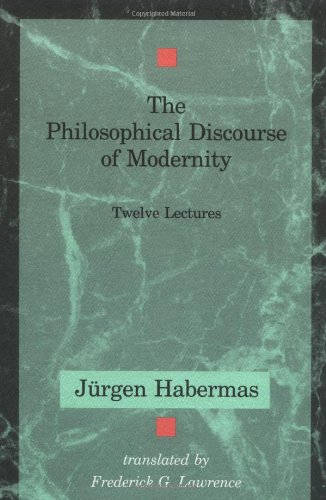The Philosophical Discourse of Modernity pdf download
Par dunlap ross le mercredi, septembre 14 2016, 02:51 - Lien permanent
The Philosophical Discourse of Modernity by Frederick Lawrence, Jurgen Habermas, Thomas McCarthy


Download eBook
The Philosophical Discourse of Modernity Frederick Lawrence, Jurgen Habermas, Thomas McCarthy ebook
ISBN: 0745608303, 9780745608303
Format: pdf
Publisher: Polity Press
Page: 456
(Stanford University Press: Stanford, CA, 2002). It gave me better ways of thinking about modernity and much else besides. The Philosophical Discourse of Modernity by Jürgen Habermas. The Dialectic of Enlightenment. Cambridge, Mass.: MIT Press, 1987. This perspective is precisely part of a discourse of modernity that is established in the 19th century in the wake of the Industrial Revolution and becomes dominant in the USA after the Scopes trial in the 1920s. Nihilism in critiquing disciplinary power or offering alternative models based in the care of the self, for instance, he is engaging in “crypto-normativity” (Habermas' term in The Philosophical Discourse of Modernity, 1992). Reflections, a pretty comprehensive blog on Jurgen Habermas's work when i came upon an article by Thomas Biebricher, which examines Habermas' interpretation of Foucault in the Philosophical Discourse of Modernity. (1999) The Social Construction of What?” Cmabridge, MA: Harvard University Press. Jürgen Habermas, “Modernity: An Unfinished Project,” in Habermas and the Unfinished Project of Modernity: Critical Essays on The Philosophical Discourse of Modernity, ed. The Philosophical Discourse of Modernity: Twelve Lectures. <>The obvious starting point for the analysis of the Habermas – Derrida debate is Habermas' 1987 book The Philosophical Discourse of Modernity in which one 'lecture' and one 'excurses' deal with Derrida. (MIT Press: Cambridge, Mass, 1996). Heidegger has no objection to such a rational framework if it is understood clearly to be a technical means (it is perhaps this distinction that Habermas occults in 'Philosophical Discourse of Modernity'). For short accounts relevant for the present purpose, see Habermas, Jurgen, The Philosophical Discourse of Modernity, translated by Frederick G. Horkheimer, Max & Adorno, Theodor W. (1987) The Philosophical Discourse of Modernity. In The Philosophical Discourse of Modernity: Twelve Lectures, 106-130. Thus, Habermas's project is rooted in modernity and Enlightenment with claims of universalization of action norms (discourse ethics) to institutionalize democratic deliberative polity based on the rule of law. Scientific reasoning does not sit easily with the presuppositions of any religion, and the work of Enlightenment philosophers made the belief in God appear irrational…It is easy to imagine Mohammed Atta, at Hamburg . Since the 1960s the Frankfurt School has been guided by Jürgen Habermas' (born 1929) work on communicative reason, linguistic intersubjectivity and what Habermas calls “the philosophical discourse of modernity“.